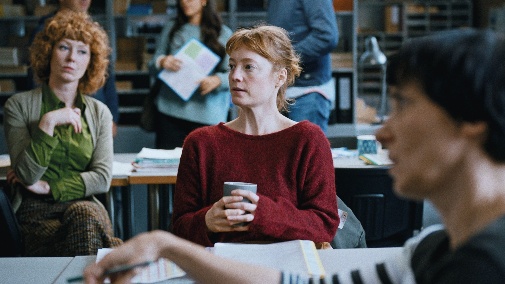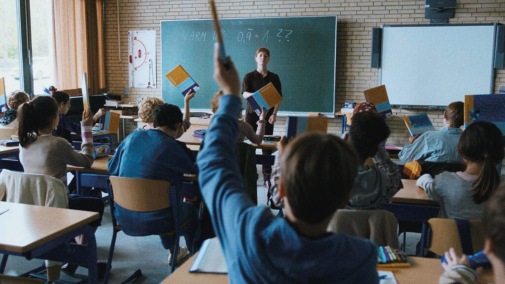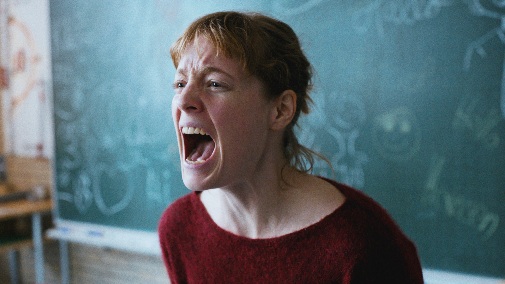
Germany’s official submission for the 96th Academy Awards starts with a students’ rights violation. Between teachers and administration, headaches abound due to a series of thefts with no apparent culprit. By the time we meet them, with no solution in sight, the staff sanctions two teachers to go into a classroom and question the students. When no kid comes forward with a confession, not even after the class representatives are pressured, the educators insist on searching through their belongings. A suspicious amount of money is found in a wallet, paranoia combined with xenophobic distrust toward the child’s Turkish origins. Turns out the money was a present from his parents.
It’s an embarrassment for all, especially Carla Nowak, the teacher whose classroom got raided. New to the school and full of righteous indignation, she sets out to make a point, kickstarting a chain of events that will soon slip out of everyone’s control…

Played by Leonie Benesch, Carla is a nervous bolt of energy walking through the school’s hallways, captured in grainy Academy ratio for maximum claustrophobia. The camera chases her from behind as if she were a Dardennes heroine, puncturing personal bubbles as it seeks to capture every evidence of strain and stress in the Math and PE teacher’s daily routine. Even before she acts out, one senses a roiling tension beneath the surface, partly from a newbie’s anxiety and a sense of kinship toward her wrongly accused student. Like him, she’s the child of immigrants – Polish in her case – though she rarely speaks her mother tongue.
Tired of cringing at her colleague’s actions, powerless and silent, Carla decides to take action. One day, she makes sure to leave her coat behind in the teachers’ lounge, her wallet inside. It’s bait, her laptop’s camera secretly monitoring the scene. Checking back on the possessions, Carla realizes she’s been victim of the school’s thief – jackpot. Only the footage isn’t as clear as one might hope, with only an elbow visible enough to make assumptions. Thankfully or not so thankfully, the teacher recognizes the yellow-on-white star print. It belongs to Mrs. Kuhn, a kind administrative worker with a kid in Carla’s class.
Once the first accusation is made, there’s no going back. Moreover, the lounge recording is illegal, so there’s an added note of trouble when the principal insists on going to the police because it’s protocol. Though with distinct levels of resistance, everyone, even Carla, lets themselves be taken to where the process ends, be it peace or absolute disorder. The herd follows to their death. And so, the events cascade into rapid chaos, much strife, and plenty of tears. At one point, the students mobilize against their teacher, solidarity weaponized to take down the common enemy. Allegiances split, it’s hard to know who’s in the right – well, nobody is.
While Benesch remains faithful to her implosion course as Carla succumbs to a nightmare of her own making, Eva Löbau brings the dramatic pyrotechnics to Mrs. Kuhn. Breaking apart in the principal’s office, she's so vigorous you start to doubt Carla’s assumptions. Indeed, while the seventh-grade teacher is the film’s protagonist, she attains that title through merit of place, not moral superiority. Though her intentions are good, director Ilker Çatak films the narrative with enough sober-minded psychological acuity to have us doubt Carla’s reckless decisions every step of the way. That wrinkle in the storytelling saves The Teachers’ Lounge from ethical absolutisms that could hinder its political message.
Not that the filmmakers offer solutions to the problems created within the picture, preferring to vivisect the various flawed systems that make injustice the norm. The relativity of truth, of right and wrong, are such hot topics in our current political climate, and The Teachers’ Lounge doesn’t wish to resolve anything. Instead, it picks at the tapestry of contradictions its text formulates and watches it unravel into a pile of loose string. Frustrations compound, anxiety mounting with a nervous cello until you can hardly breathe without the rattle of hyperventilation tickling the throat. It would all be worth it with the fitting conclusion, but that’s not what this film has in store.

Rather than coming to an end, it fizzles out, having backed itself into a corner from where it’s difficult to imagine a clean way out. A braver project with more bite to sustain its provocations would see the messiness to its horrifying final stages. Still, Çatak’s film closes on an impasse, a shot of cheap symbolism giving the illusion of a period where an ellipsis remains. It seems wrong to criticize ambivalence when narrative cinema is so obsessed with neat plotting and finality, but it feels like cowardice here. It’s a cop-out of sorts, almost literally, hinting at wrecking breakdown without taking the final step. Nevertheless, however unsatisfying the ending may be, it doesn’t invalidate the well-constructed film preceding it. Sharply cut and sharp all over, The Teachers’ Lounge is an engaging watch even if it doesn’t stick the landing.
The Teachers Lounge will be released by Sony Pictures Classics in the US.